RIGELSEN, Oscar Rudolph
| Service Number: | 2466 |
|---|---|
| Enlisted: | 2 April 1942, Adelaide, SA |
| Last Rank: | Private |
| Last Unit: | 50th Infantry Battalion |
| Born: | Norwood, South Australia, Australia, 2 April 1893 |
| Home Town: | Norwood (SA), South Australia |
| Schooling: | Not yet discovered |
| Occupation: | Coach-builder |
| Died: | 1973, cause of death not yet discovered, place of death not yet discovered |
| Cemetery: | Not yet discovered |
| Memorials: | Norwood Primary School Honour Board |
World War 1 Service
| 21 Sep 1916: | Embarked Private, 2466, 50th Infantry Battalion, HMAT Commonwealth, Adelaide | |
|---|---|---|
| 21 Sep 1916: | Involvement Private, 2466, 50th Infantry Battalion, --- :embarkation_roll: roll_number: '19' embarkation_place: Adelaide embarkation_ship: HMAT Commonwealth embarkation_ship_number: A73 public_note: '' |
World War 2 Service
| 2 Apr 1942: | Enlisted Adelaide, SA |
|---|
Help us honour Oscar Rudolph Rigelsen's service by contributing information, stories, and images so that they can be preserved for future generations.
Add my storyBiography contributed by St Ignatius' College
Life before the war
Oscar Rudolph Rigelsen was born on 2 April 1893 in Norwood, South Australia. He had 2 siblings, Albert Eidsvola Rigelsen and Ester Rigelsen. His parents were Ester Cook and Oscar Severin Rigelsen. His religion was C.E (Church of England). Oscar Rudolph was unmarried and worked as a coachbuilder before he joined the Australian Imperial Force (AIF) on 11 May 1916 when he was 23. His service number was 2466.
Life in service
Rigelsen was ranked as a Private in the 50th battalion but later became a Driver in the 1st Australian Mechanical Transport service. Privates were just ordinary soldiers; they were the lowest rank in an army. Drivers were soldiers who operated and managed army vehicles in combat support and combat service support roles. They carried a variety of loads including cargo, other soldiers and dangerous goods.
Approximately half of the 50th Battalion consisted of veterans from the 10th Battalion, and the other half, new reinforcements from Australia. Oscar Rudolph embarked from Adelaide on board the HMAT A73 Commonwealth on 21 September 1916. Rigelsen served in England and France.
Rigelsen was trained in Egypt with 50,000 other men in total meaning that makeshift camps were erected in sporting fields and farms all around the country. The training itself was laborious and of a high intensity. The men trained for 8 hours a day, six days a week. The desert wind blew on them making many of the men sick. Some died of pneumonia.
The 50th battalion fought in the Battle of Mouquet farm in August until September 1916 and it also fought in the battles at Messines and Polygon Wood on the Hindenburg Line in 1917. In 1918, it assisted in warding off the Spring Offensive on the Western Front and On the 24th April 1918, the battalion assisted in counter-attack at Villers-Bretonneux in Belgium. In August, they joined the Allied offensive of the war around Amiens until 18 September when the 50th Battalion fought its last battle against the Hindenburg “Outpost Line”. Although it is unclear in which battles Rigelsen actively took part in, he did march in Ex-England, Etaples on 1 January 1917. In the 50th Battalion, a total of 720 men were killed and 1557 were wounded.
Oscar Rudolph was never fatally injured but he made a couple visits to the hospital due to illness. Two of these occasions were in France. The first visit being on 10 October 1917 and the second on 8 November 1917.
After the war
After the war, Oscar Rudolph Rigelsen came back to Australia on 27 August 1919 and married Emma Olive Danks. He died of old age in 1973 (the year he turned 80).
Rigelsen was awarded 2 medals for his services, the British War Medal and the Victory medal.










